We may not have the course you’re looking for. If you enquire or give us a call on +61 272026926 and speak to our training experts, we may still be able to help with your training requirements.
Training Outcomes Within Your Budget!
We ensure quality, budget-alignment, and timely delivery by our expert instructors.
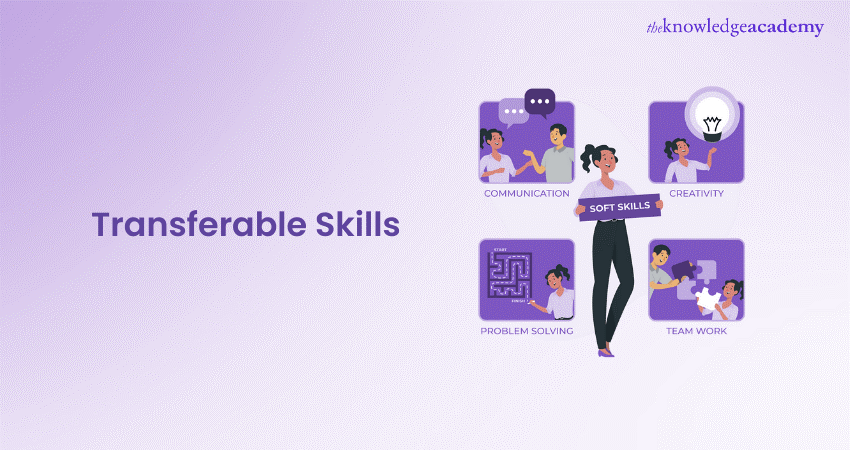
Imagine you are starting a new job or even switching industries. The skills you have gained in past roles can help you succeed, no matter where you go. These are called Transferable Skills - abilities that can be applied to different jobs, making you more adaptable and valuable in the workplace.
Transferable Skills, from communication to problem-solving, are essential for career growth. In this blog, we discuss what these skills are, why they matter, and how you can highlight them to take your career to the next level.
Table of Contents
1) What are Transferable Skills?
2) Top Transferable Skills
a) Effective Communication
b) Reliability
c) Team Collaboration
d) Organisation
e) Leadership
f) Empathy
g) Initiative
h) Time Management
i) Creative Thinking
j) Adaptability
3) Ways to Showcase Your Transferable Skills
4) Conclusion
What are Transferable Skills?
Transferable Skills are abilities that are useful in various jobs and life situations. Everyone develops these skills throughout their life, whether in school, different jobs, mentorships, or volunteering. For instance, writing essays in college can teach you research skills, while your current job might help you learn Project Management or Data Analysis.
Transferable Skills are important for employers because they are useful in many different industries. The more Transferable Skills you have, the more attractive you are as a job candidate, and the easier it is to switch roles or even change careers. These skills are not just useful at work; they can also help in everyday life.
Top Transferable Skills
Let’s look at some of the most important Transferable Skills that employers value. These skills can be developed in any job and used in many other roles or fields.
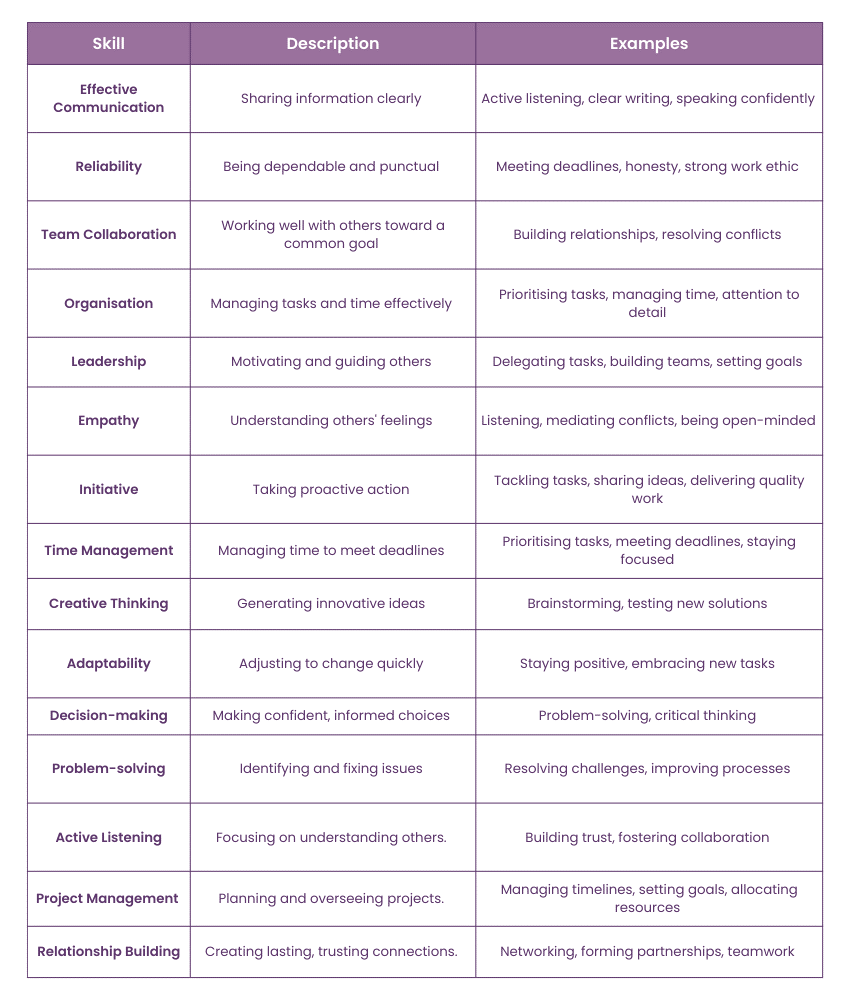
1) Effective Communication
This means sharing information clearly through talking, writing, or other ways. Good communication helps you ask questions, understand body language, and talk to people in different situations. At work, strong communicators can work well with others and keep projects moving forward. Examples include active listening, writing clearly, and speaking confidently.
2) Reliability
Being dependable means people can trust you to do your job well and on time. It includes being punctual, organised, and responsible. Employers look for dependable employees to manage tasks and relationships effectively. Examples include meeting deadlines, being honest, and having a strong work ethic.
3) Team Collaboration
Teamwork is working well with others to achieve a common goal. It requires empathy, good listening, and strong communication. Showing examples of teamwork in interviews can help employers see how you’ll fit into their team. Examples include building relationships, collaborating, and resolving conflicts.
4) Organisation
Being organised means keeping your workspace and tasks in order. Organised people meet deadlines, communicate promptly, and follow instructions well. Employers trust organised workers to complete projects efficiently. Examples include managing time, paying attention to detail, and prioritising tasks.
5) Leadership
Leadership involves guiding and motivating others to reach shared goals. It includes strong communication, relationship building, and dependability. Leaders can organise teams and manage projects effectively. Examples include delegating tasks, building teams, and setting goals.
6) Empathy
Empathy means understanding others' feelings. It helps build strong relationships and a healthy work environment. Jobs that involve working with people value empathy. Examples include good listening, mediating conflicts, and being curious about others' perspectives.
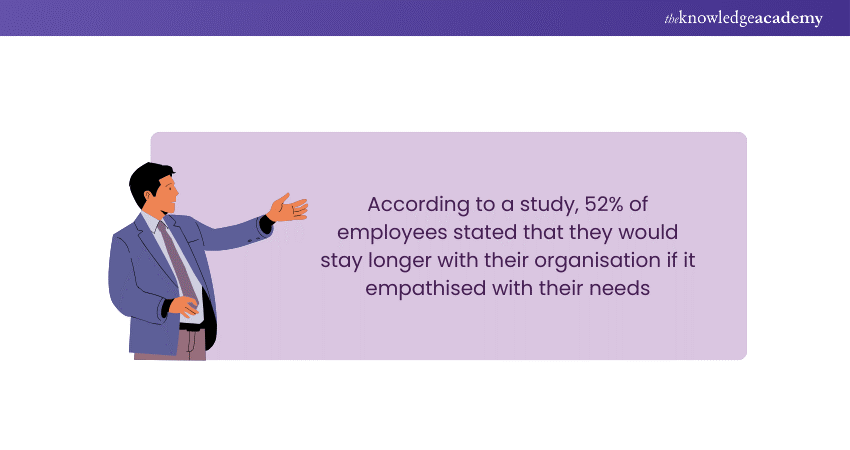
7) Initiative
Being self-motivated at work is impressive in any industry. Taking the initiative to tackle new tasks, share ideas, and deliver high-quality work shows dedication. This often leads to career advancement.
8) Time Management
Good time management makes you more efficient, regardless of deadlines and productivity expectations. Effective time managers allocate time based on task priority, set boundaries for focus time, and consistently meet deadlines.
9) Creative Thinking
Creative thinking is valuable in any career. It helps you think outside the box when facing problems. Creative thinkers generate multiple ideas, test and refine theories, and develop innovative solutions. They are willing to try new approaches until they succeed.
10) Adaptability
Adaptability means adjusting to changes and continuing to work towards goals. Employers value flexible candidates who can learn new skills quickly. Adaptable people handle changes in teams, projects, or management with a positive attitude. Examples include being creative, staying positive, and being patient.
11) Decision-making
Decision-making involves making good choices quickly and confidently. It includes analysing situations, predicting outcomes, and taking action. Employers value decision-makers for their judgment and efficiency. Examples include solving problems, thinking critically, and being creative.
12) Problem-solving
Problem-solving skills are crucial for handling the challenges and complexities of any job. People with strong problem-solving abilities can identify issues, analyse their root causes, and develop innovative solutions. Whether it's fixing technical problems, resolving team conflicts, or improving processes, the ability to approach problems systematically and creatively is highly valued by employers.
13) Active Listening
Listening skills are vital for communication and understanding others' needs and perspectives. Those with strong listening skills can focus attentively, understand information accurately, and respond thoughtfully. By actively listening to colleagues, clients, or stakeholders, they build trust, foster collaboration, and address issues effectively, leading to positive relationships and successful outcomes.
14) Project Management
Project management skills involve planning, organising, executing, and overseeing projects from start to finish. Individuals with these skills can set project goals, create detailed plans, allocate resources, monitor progress, and manage risks. By coordinating tasks, managing timelines, and ensuring quality deliverables, they drive successful project outcomes and help achieve organisational goals.
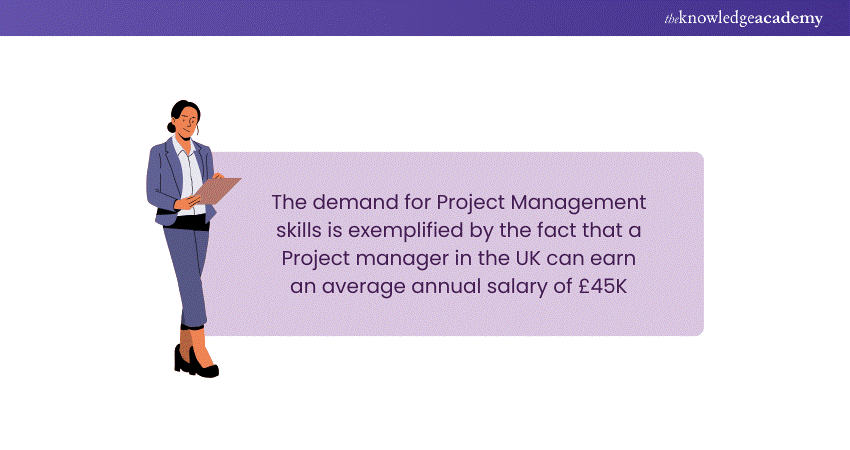
15) Relationship Building
Relationship building skills involve creating and maintaining connections based on trust, mutual respect, and shared interests. People with strong relationship-building skills can network effectively, form meaningful connections, and develop long-term partnerships. By building rapport with colleagues, clients, or stakeholders, they enhance teamwork, foster collaboration, and work towards shared goals, contributing to both personal and professional success.
Learn how Emotional Intelligence can be applied in organisations with our Emotional Intelligence Training – Join today!
Ways to Showcase Your Transferable Skills
You can showcase your Transferable Skills on your resume, cover letter, and during interviews. Start by reviewing the job description to find which of your skills are most relevant to the position.
Transferable Skills on a Resume
On your resume, you can highlight Transferable Skills in several sections:
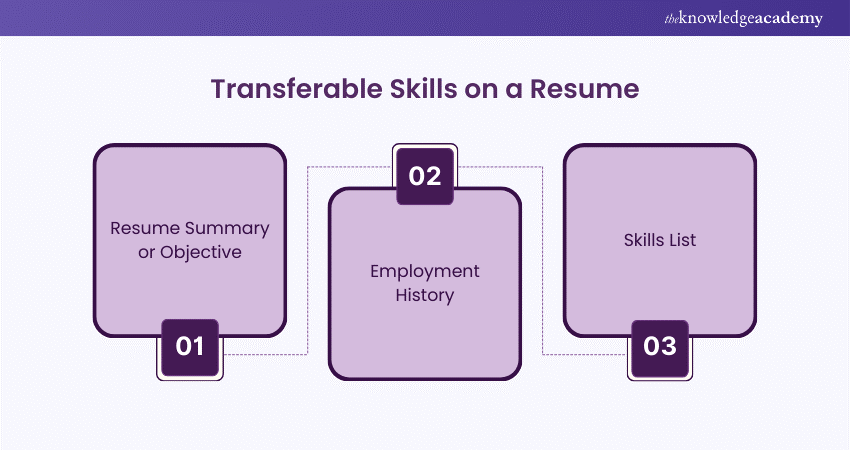
a) Resume Summary or Objective: Mention your most valuable and relevant transferable skill. For example, if you have strong leadership skills, you might write, "Dynamic team leader with seven years of experience using leadership skills to drive project success and team collaboration."
b) Employment History: Instead of just listing job duties, highlight two to three key accomplishments that demonstrate your Transferable Skills. For example, "Led a team to develop a new marketing strategy, resulting in a 15% increase in customer engagement."
c) Skills List: Include your strongest Transferable Skills, tailored to the job description. Look for skills mentioned under "job duties" or "requirements."
Transferable Skills in a Cover Letter
In your cover letter, focus on one or two Transferable Skills that are highlighted in the job description. Describe how you have used these skills in past roles. For example, "As a project coordinator at XYZ Corp, I managed cross-functional teams and streamlined processes, leading to a 20% improvement in project delivery times."
Transferable Skills During Interviews
During interviews, use specific examples to showcase your Transferable Skills. Instead of just telling the interviewer about your skills, share stories that show how you have successfully used them in the past. For example, "In my previous role, I identified a major bottleneck in our workflow and implemented a new system that reduced processing time by 30%."
Master effective communication with our Active Listening Training – Join today!
Conclusion
Transferable Skills are the building blocks of a successful career. By focusing on developing and showcasing your Transferable Skills, you’ll not only increase your value to employers but also set yourself up for long-term career success. Start building these skills today and use them as your secret weapon for career growth!
Learn to articulate ideas clearly with our Effective Communication Skills Course – Sign up now!
Frequently Asked Questions

Employers value Transferable Skills because they show that you can succeed in various tasks and roles, even if you're new to the job. These skills also make it easier for you to adapt to changes in the workplace and help the company grow.

To identify your Transferable Skills, think about what you do well in your current job, like communicating, problem-solving, or working in a team. You can also ask for feedback from colleagues or look at past experiences to recognise skills you have used in different situations.

The Knowledge Academy takes global learning to new heights, offering over 30,000 online courses across 490+ locations in 220 countries. This expansive reach ensures accessibility and convenience for learners worldwide.
Alongside our diverse Online Course Catalogue, encompassing 19 major categories, we go the extra mile by providing a plethora of free educational Online Resources like News updates, Blogs, videos, webinars, and interview questions. Tailoring learning experiences further, professionals can maximise value with customisable Course Bundles of TKA.

The Knowledge Academy’s Knowledge Pass, a prepaid voucher, adds another layer of flexibility, allowing course bookings over a 12-month period. Join us on a journey where education knows no bounds.

The Knowledge Academy offers various Personal Development Courses, including the Career Development Course, Active Listening Training, and Emotional Intelligence Training. These courses cater to different skill levels, providing comprehensive insights into Customer Experience Automation.
Our Business Skills Blogs cover a range of topics related to Transferable Skills, offering valuable resources, best practices, and industry insights. Whether you are a beginner or looking to advance your Business Skills, The Knowledge Academy's diverse courses and informative blogs have got you covered.
Upcoming Business Skills Resources Batches & Dates
Date
 Active Listening Training
Active Listening Training
Fri 10th Jan 2025
Fri 28th Feb 2025
Fri 4th Apr 2025
Fri 16th May 2025
Fri 11th Jul 2025
Fri 19th Sep 2025
Fri 21st Nov 2025







 Top Rated Course
Top Rated Course



 If you wish to make any changes to your course, please
If you wish to make any changes to your course, please


